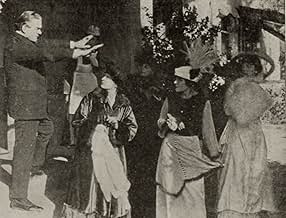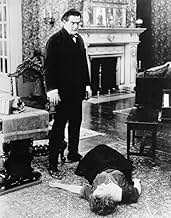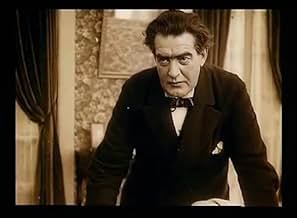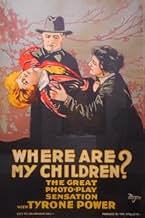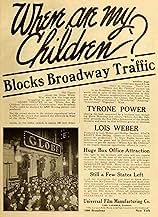Agrega una trama en tu idiomaA District Attorney's outspoken stand on abortion lands him in trouble with the local community.A District Attorney's outspoken stand on abortion lands him in trouble with the local community.A District Attorney's outspoken stand on abortion lands him in trouble with the local community.
- Dirección
- Guionistas
- Elenco
- Premios
- 1 premio ganado en total
Tyrone Power Sr.
- District Attorney Richard Walton
- (as Mr. Tyrone Power)
Mrs. Tyrone Power
- Mrs. Richard Walton
- (as Helen Riaume)
Alva D. Blake
- Roger - Mrs. Walton's Brother
- (as A.D. Blake)
George Berrell
- Judge
- (sin créditos)
Georgia French
- Child
- (sin créditos)
Mary MacLaren
- Walton's Maid
- (sin créditos)
Andy MacLennan
- Man on Street
- (sin créditos)
Anne Power
- Infant
- (sin créditos)
Opiniones destacadas
This remarkable film has sometimes been described by historians as a movie about birth control, but it isn't, although birth control is presented as an alternative to abortion, which is the film's true subject. "Where Are My Children" is probably the most forthrightly anti-abortion movie ever made by a mainstream American studio, and how Lois Weber got away with it, I'll never know; a film like this couldn't possibly be made today.
I have no objections to a filmmaker using a movie as a vehicle for his or her convictions, as long as they're honest about it, and this movie is honest. Weber follows the logic of her plot, and her convictions, right to their end, without flinching from the logical and merciless conclusion. This is a gripping and powerful tragedy, well acted, written and directed. There is one unforgettable moment in which a quiet little gesture by Helen Riaume tells volumes; she has taken her friend to a doctor who performs abortions (and has done so for her), and while lingering in the waiting room, Helen yawns, as if terminating a pregnancy is a completely casual matter. It is a perfect, subtle sign about the depth of her corruption.
"Where Are My Children" isn't perfect; the scenes of souls in Heaven's antechamber, "waiting to be born," are a little heavy-handed, even if they give Weber the chance to use the trick photography she was so fond of. But the skill with which this movie is made is remarkable for 1916; this is a much more powerful movie than Griffith's "Intolerance," the most famous film of that year. I was amazed by "Where Are My Children," and I will never forget it.
I have no objections to a filmmaker using a movie as a vehicle for his or her convictions, as long as they're honest about it, and this movie is honest. Weber follows the logic of her plot, and her convictions, right to their end, without flinching from the logical and merciless conclusion. This is a gripping and powerful tragedy, well acted, written and directed. There is one unforgettable moment in which a quiet little gesture by Helen Riaume tells volumes; she has taken her friend to a doctor who performs abortions (and has done so for her), and while lingering in the waiting room, Helen yawns, as if terminating a pregnancy is a completely casual matter. It is a perfect, subtle sign about the depth of her corruption.
"Where Are My Children" isn't perfect; the scenes of souls in Heaven's antechamber, "waiting to be born," are a little heavy-handed, even if they give Weber the chance to use the trick photography she was so fond of. But the skill with which this movie is made is remarkable for 1916; this is a much more powerful movie than Griffith's "Intolerance," the most famous film of that year. I was amazed by "Where Are My Children," and I will never forget it.
Quite interesting film given its time and subject matter: birth control and abortion in pre-WW I America. There's even some mention of Eugenics, which was quite a popular theory of that time. I will avoid any spoilers but the movie is pro-birth control and very heavy-handily anti-abortion. But, inadvertently, the moral case is made for safe and legal abortions!
I find it interesting that Mrs. Walton is credited as Helen Riaume (with no IMDb link). This appears to have been the same Helen Riaume who is credited elsewhere as "Mrs. Tyrone Power," and was Tyrone Power Sr.'s wife until the same year this was released. The content of this film is unusual enough, and having a married couple playing the leads and not credited as such adds to the interest.
In particular, the content was of a controversial nature in 1916, and is even more so today, with the sides reversed. The topic of abortion (called simply "birth control" in this movie) was not one that was raised often in films anyway, and moral guardians would have hesitated to let a movie through that favored the practice. The climate of Hollywood being what it is today, there might be no legal impediment to making a similarly anti-abortion film, but it would certainly be frowned upon, and perhaps de facto blacklisted.
In particular, the content was of a controversial nature in 1916, and is even more so today, with the sides reversed. The topic of abortion (called simply "birth control" in this movie) was not one that was raised often in films anyway, and moral guardians would have hesitated to let a movie through that favored the practice. The climate of Hollywood being what it is today, there might be no legal impediment to making a similarly anti-abortion film, but it would certainly be frowned upon, and perhaps de facto blacklisted.
10gonboy67
What audiences of 80-plus years ago must have thought of this film is unimaginable....very provocative, powerfully written and acted. With a few expansions the story could even be interesting today: pro-life District Attorney finds out the secret behind all the childless marriages in his party-hopping wife's social circle. Final scene so bittersweet..and on the lighter side, some excellent women's fashion from the era in costuming. Highest recommendation.
This film is most certainly not feminist but it was a courageous film to have made in 1910. Censorship already existed very strongly in the US and the idea that it only came in with the Hays Code in the thirties is a complete myth.
The film did have its imitators in the next year or so (a girl dies after an abortion in Enlighten thy Daughter 1917) and the subject would occasionally be raised rather obliquely in later films (The Road to Ruin 1928, 1934 and Ann Vickers 1933) or treated salaciously in exploitation films (Street Corner 1948) but it would not be until the 1960s that it would again become possible to treat such subjects seriously in US films (and even then it is primarily British rather than US films that come to mind). Plans to make a remake of Weber's film in 1936 had to be cancelled. As late as 1956, the revised Hays code insisted that "the subject of abortion shall be discouraged, shall never be more than suggested, and when referred to shall be condemned. It must never be treated lightly, or made the subject of comedy. Abortion shall never be shown explicitly or by inference, and a story must not indicate that an abortion has been performed, the word "abortion" shall not be used."
Weber's consideration of the question is entirely serious and all the aspects she considers, whatever one's opinion about voluntary miscarriage being legal of which there was not even the remotest possibility in 1916, remain entirely valid. Sometimes today the belief that women should have choice in these matters becomes confused with a vague idea that abortion is somehow completely problem-free, which it most certainly is not.
And Weber is entirely to be commended for taking up so strongly the case for birth control (an equally taboo subject)and against the 1873 Comstock Law that prevented discussion of it. This was also the subject of an unofficial sequel to this film (lost) called The Hand that Rocks the Cradle, in which she herself acted (and is the one arrested for promoting birth control). The film was, however, rather overshadowed by the appearance of Margaret Sanger's own film Birth Control even though the latter was effectively banned by the censors.
The film played to packed houses in sophisticated urban centres and won much critical praise because of its evident earnestness and religious iconography (one southern US newspaper described it as "one of the most remarkable preachments yet filmed") but it did also attract adverse criticism but it had to be shown in different (cut) versions in different parts of the country, and was particularly badly butchered (although not banned as is sometimes claimed) in Weber's home-state of Pennsylvania.
There are also some signs of a backlash. Photoplay later claimed that the films had spawned "a filthy host of nasty-minded imitators" and in 1917 when Essanay brought out a filmed called "Where is My Mother?" (evidently adapting the title of Weber's film) in its "Do the Children Count?" series, a particularly prissy reviewer in Moving Picture World praised it precisely because it avoided "distasteful reference to birth control and sex problems".
The film did have its imitators in the next year or so (a girl dies after an abortion in Enlighten thy Daughter 1917) and the subject would occasionally be raised rather obliquely in later films (The Road to Ruin 1928, 1934 and Ann Vickers 1933) or treated salaciously in exploitation films (Street Corner 1948) but it would not be until the 1960s that it would again become possible to treat such subjects seriously in US films (and even then it is primarily British rather than US films that come to mind). Plans to make a remake of Weber's film in 1936 had to be cancelled. As late as 1956, the revised Hays code insisted that "the subject of abortion shall be discouraged, shall never be more than suggested, and when referred to shall be condemned. It must never be treated lightly, or made the subject of comedy. Abortion shall never be shown explicitly or by inference, and a story must not indicate that an abortion has been performed, the word "abortion" shall not be used."
Weber's consideration of the question is entirely serious and all the aspects she considers, whatever one's opinion about voluntary miscarriage being legal of which there was not even the remotest possibility in 1916, remain entirely valid. Sometimes today the belief that women should have choice in these matters becomes confused with a vague idea that abortion is somehow completely problem-free, which it most certainly is not.
And Weber is entirely to be commended for taking up so strongly the case for birth control (an equally taboo subject)and against the 1873 Comstock Law that prevented discussion of it. This was also the subject of an unofficial sequel to this film (lost) called The Hand that Rocks the Cradle, in which she herself acted (and is the one arrested for promoting birth control). The film was, however, rather overshadowed by the appearance of Margaret Sanger's own film Birth Control even though the latter was effectively banned by the censors.
The film played to packed houses in sophisticated urban centres and won much critical praise because of its evident earnestness and religious iconography (one southern US newspaper described it as "one of the most remarkable preachments yet filmed") but it did also attract adverse criticism but it had to be shown in different (cut) versions in different parts of the country, and was particularly badly butchered (although not banned as is sometimes claimed) in Weber's home-state of Pennsylvania.
There are also some signs of a backlash. Photoplay later claimed that the films had spawned "a filthy host of nasty-minded imitators" and in 1917 when Essanay brought out a filmed called "Where is My Mother?" (evidently adapting the title of Weber's film) in its "Do the Children Count?" series, a particularly prissy reviewer in Moving Picture World praised it precisely because it avoided "distasteful reference to birth control and sex problems".
¿Sabías que…?
- TriviaThe two children of Tyrone Power Sr. and his co-star and real-life wife Helen Reaume (aka, Mrs. Tyrone Power), appear in this film: their newborn daughter Anne Power and their two-year-old son Tyrone Power, who became a matinee idol from the 1930s to the 1950s. He appears in the last minute and a half of the movie as a "ghost child".
- Citas
Opening Title Card I: The question of birth control is now being generally discussed. All intelligent people know that birth control is a subject of serious public interest. Newspapers, magazines and books have treated different phases of this question. Can a subject thus dealt with on the printed page be denied careful dramatization on the motion picture screen? The Universal Film Mfg. Company believes not.
- Versiones alternativasIn 2000, the Library of Congress Motion Picture Conservation Center copyrighted a preservation print reconstructed from several incomplete prints. Funded by the Women's Film Preservation Fund of New York Women in Film and Television, it was coordinated by Scott Simmon, has a piano score composed and performed by Martin Marks, and runs 62 minutes.
- ConexionesEdited into Governing Body (2023)
Selecciones populares
Inicia sesión para calificar y agrega a la lista de videos para obtener recomendaciones personalizadas
Detalles
- Fecha de lanzamiento
- País de origen
- Idiomas
- También se conoce como
- The Illborn
- Locaciones de filmación
- Productoras
- Ver más créditos de la compañía en IMDbPro
- Tiempo de ejecución
- 1h 2min(62 min)
- Mezcla de sonido
- Relación de aspecto
- 1.33 : 1
Contribuir a esta página
Sugiere una edición o agrega el contenido que falta

